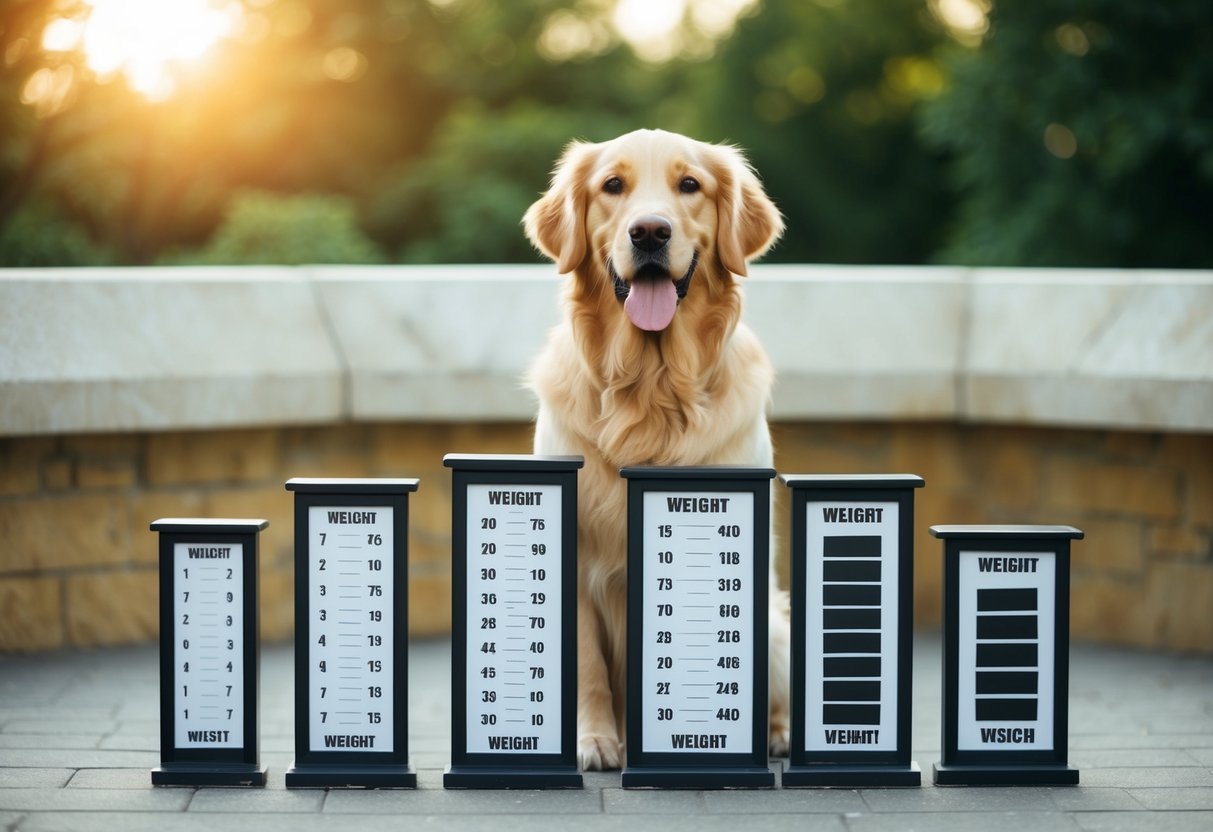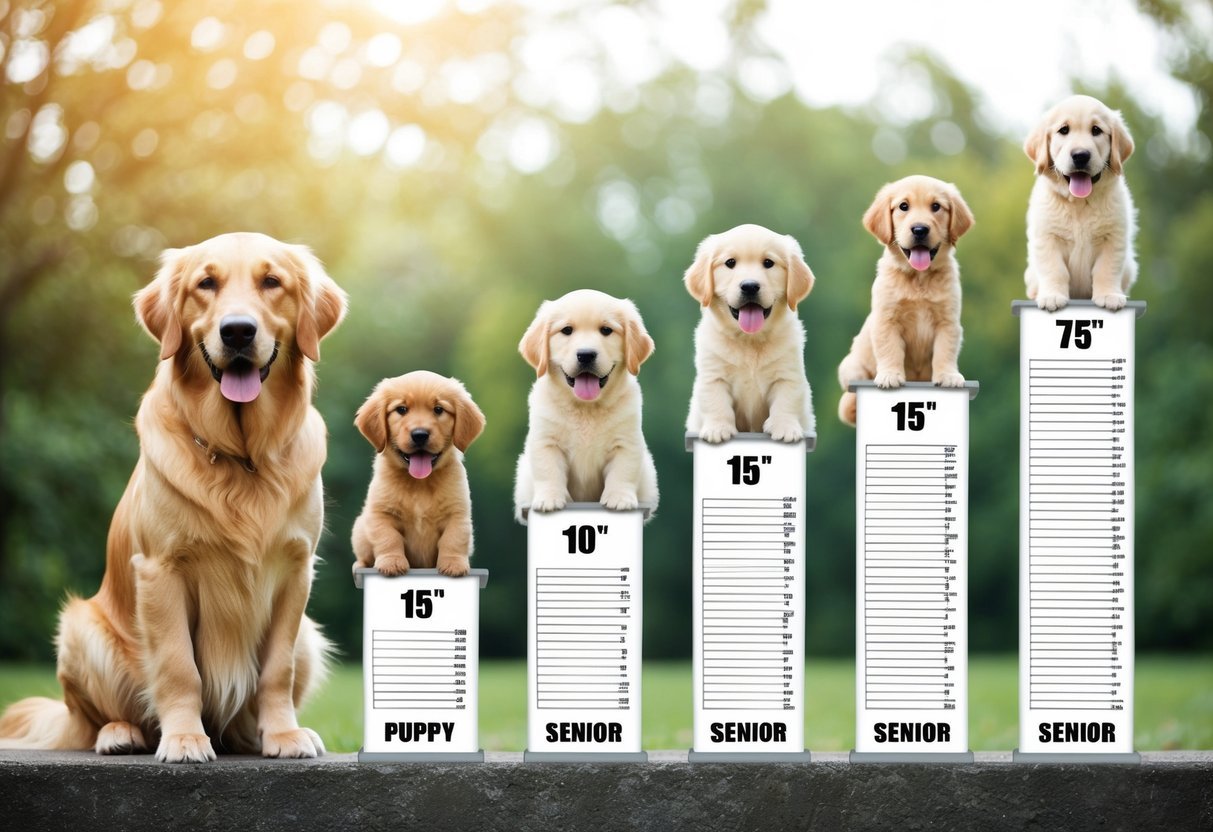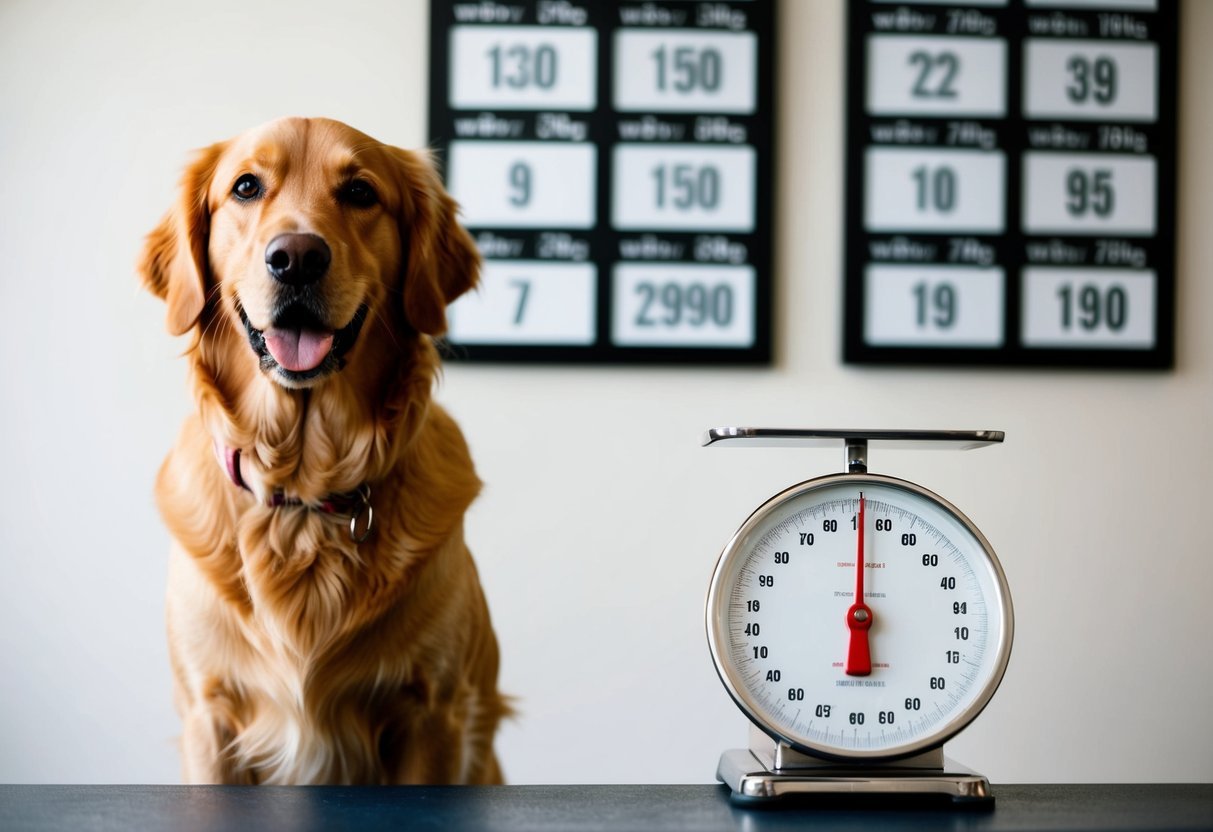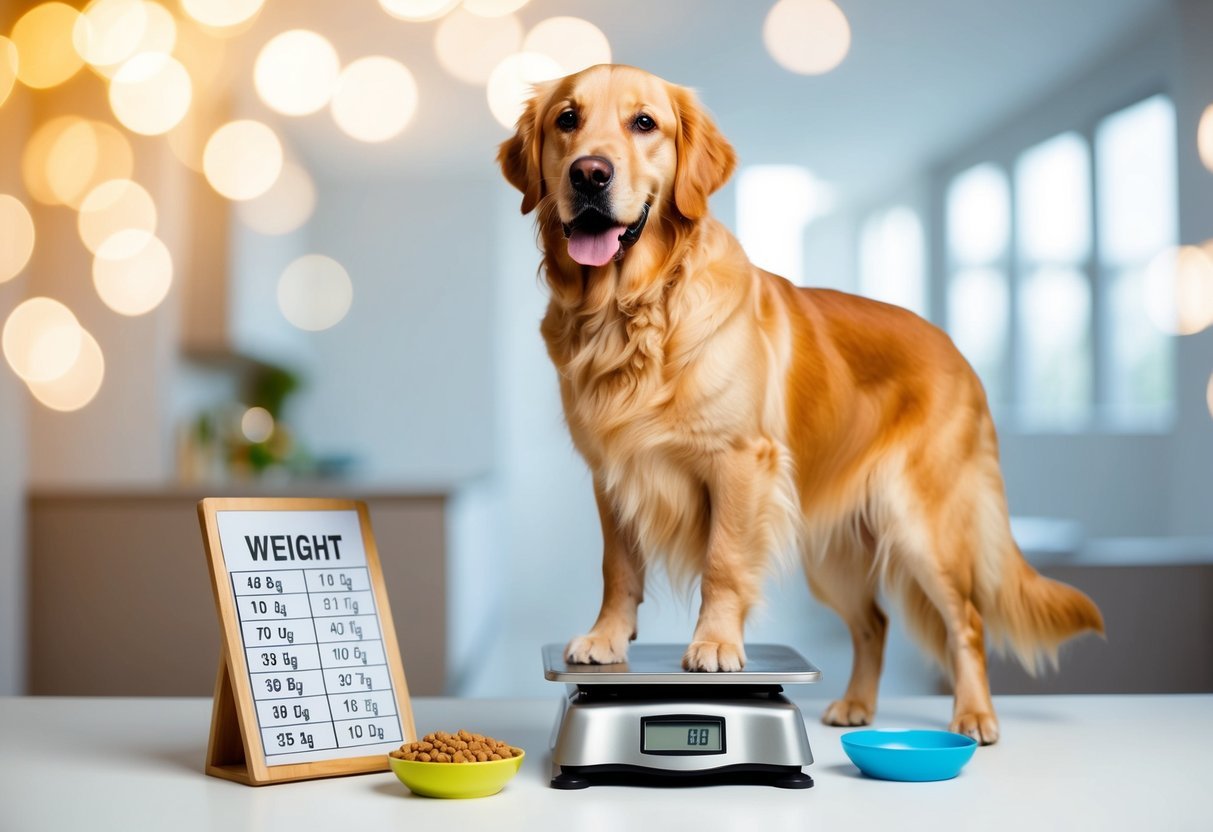Finding the right weight for your Golden Retriever is essential for their health and happiness.
With the right growth and weight charts, you can easily track your dog’s progress and ensure they maintain a healthy weight throughout their life.
These charts provide valuable insights into the expected weight ranges at different ages and stages.
In this article, you will discover seven weight charts that can guide you as a pet owner.
Keeping an eye on your Golden’s weight can help prevent health issues and promote a longer, happier life for your furry friend.
1) Weekly Weigh-Ins
Keeping track of your Golden Retriever’s weight is important for their health.
Doing weekly weigh-ins helps you spot any changes early.
Start by using a regular scale, if you can.
Weigh yourself first, then hold your pup and weigh again.
Subtract your weight from the total to find your dog’s weight.
Puppies grow quickly, so weigh-ins are key during their first year.
They typically gain 5% to 10% of their weight each week.
If your puppy looks thinner or gains weight faster than usual, talk to your vet.
For adult dogs, checking weight every week helps maintain a healthy size.
Golden Retrievers can be prone to weight gain, so being proactive is better.
If you notice a significant change, adjust their food or exercise routine.
Regular weigh-ins keep you informed about your dog’s health.
Being attentive to their weight means you can ensure they stay healthy and happy.
Enjoy the journey with your furry friend while monitoring their growth!
Keep it Lean: Body Condition Score
Maintaining a healthy weight for your Golden Retriever is essential.
A great tool for this is the Body Condition Score (BCS).
BCS helps you judge your dog’s fat levels.
It uses a scale from 1 to 9.
A score of 1, 2, or 3 means your dog is too skinny.
A score of 4 or 5 is ideal, showing they’re at a healthy weight.
Scores above 5 indicate your dog is overweight.
To evaluate your dog’s BCS, look at their body shape.
You should feel their ribs without much pressure.
If you can’t feel them easily, your dog may need to shed some pounds.
You can also check how much belly your dog has when standing.
A well-fed dog should have a slight tuck at the belly, not a bulging waistline.
Regular check-ups with your vet can help you keep track of your dog’s weight.
They can guide you on how to adjust your dog’s diet and exercise to maintain that perfect BCS.
Keeping your Golden Retriever lean promotes better health and a longer life.
Golden Growth Hacks

To help your Golden Retriever grow strong and healthy, keep an eye on their weight and height.
Use a reliable growth chart to track their progress.
This way, you can ensure they stay within healthy limits.
Regular vet check-ups are important.
Your vet can provide insights about your pup’s growth and help you adjust their diet if needed.
Remember, each dog is unique and may grow at different rates.
Feeding your pup a balanced diet is crucial.
Look for high-quality dog food that meets their nutritional needs.
This gives them the energy they need for playtime and growth.
Don’t forget exercise! Aim for at least 30-60 minutes of activity every day.
This keeps their muscles strong and helps maintain a healthy weight.
Finally, watch out for common issues.
Golden Retrievers can be prone to obesity.
Keeping your dog active and monitoring their food intake will help you avoid this problem.
Catch any weight changes early to keep your furry friend in great shape.
4) Food Portions by Age

Feeding your Golden Retriever the right amount of food is important at every stage of life.
Puppies need more nutrients because they are growing, while adults and seniors have different needs.
As a puppy, your Golden will require puppy food until about 10 to 12 months old.
Young males may need up to 3 and 1/2 to 4 cups a day, while females usually need about 3 cups.
Once your dog becomes an adult, which happens around 1 year of age, you can shift to adult food.
Active adults typically require between 1,300 to 1,700 calories daily, depending on their size and activity level.
For seniors, especially those 8 years and older, you should adjust portions based on how active they are.
Their energy needs decline, so a high-quality senior food can help manage weight while keeping them healthy.
Checking with your vet is always a smart idea for personalized feeding advice.
They can help you find the perfect balance based on your dog’s age, weight, and overall health needs.
5) Puppy to Senior: Weight Milestones

From the time you bring your Golden Retriever puppy home, tracking their weight is important.
When born, a Golden Retriever puppy typically weighs between 14 to 16 ounces.
By six months, your puppy can grow rapidly, reaching around 50 pounds.
This is a key growth phase, so make sure you’re feeding them a balanced diet.
As your puppy transitions to an adult, they will reach their full weight by about 18 months.
Males usually weigh between 65 and 80 pounds, while females weigh about 55 to 70 pounds.
In their senior years, your Golden may start to slow down.
It’s important to monitor their weight and adjust their diet to keep them healthy.
Maintaining a healthy weight can help avoid joint issues and other health problems down the line.
Knowing these milestones helps you keep track of your dog’s growth and health.
Regular vet check-ups can provide guidance tailored to your dog’s specific needs.
Understanding Golden Obesity

Obesity is a common problem in Golden Retrievers and can lead to serious health issues.
If your dog is overweight, it might suffer from joint pain, diabetes, or heart problems.
Many factors contribute to obesity.
Poor diet and lack of exercise are the main culprits.
Goldens love food, so you should be careful about how many treats and table scraps you give.
Regular exercise is crucial.
Make sure to take your dog for daily walks and play active games like fetch.
This helps burn off calories and keeps your dog happy.
Monitor your Golden’s weight regularly.
You can use a weight chart to see if your dog is at a healthy size.
A vet can also assist in creating a weight management plan tailored for your pet.
Keeping track of your dog’s weight is essential for its well-being.
If you think your Golden is gaining weight, don’t wait.
Start making changes today to ensure you have a healthy and happy companion.
7) Exercise: A Daily Must

Exercise is key for keeping your Golden Retriever healthy and happy.
They need regular activity to maintain a healthy weight and strong muscles.
Aim for about 60 to 120 minutes of exercise each day.
This can include walks, playtime, and even some training sessions.
Mixing up activities keeps things interesting for your dog.
If you live in a smaller space, there are still ways to keep them active.
Indoor games like fetch or tug-of-war are great options.
You can also try agility training to challenge their minds and bodies.
Pay attention to your dog’s energy levels.
If they seem restless or bored, it might be time for a little extra exercise.
Regular activity can also help prevent behavioral issues.
Remember, exercise is not just about physical health; it also supports their mental well-being.
A well-exercised dog is often a happier and better-behaved companion.
Understanding Golden Retriever Weight Basics

Golden Retrievers are known for their friendly nature and sturdy build.
Knowing their weight basics is key to ensuring a healthy life.
Here are important details about their average weight range and the factors that can affect their weight.
Average Weight Range
For Golden Retrievers, the average weight typically varies by gender.
Adult males usually weigh between 65-77 pounds, while females range from 55-65 pounds.
Here’s a quick breakdown:
| Age | Weight (Males) | Weight (Females) |
|---|---|---|
| 8 Weeks | 10-15 pounds | 8-12 pounds |
| 6 Months | 40-50 pounds | 35-45 pounds |
| 1 Year | 65-77 pounds | 55-65 pounds |
Keep in mind that individual dogs can vary.
It’s okay if your dog is a bit over or under the average, but significant changes should be monitored.
Factors Affecting Weight
Several factors can influence your Golden Retriever’s weight.
-
Genetics: Breeding plays a big role in weight. Some dogs may naturally weigh more or less than the average.
-
Diet: What you feed your pup matters. High-quality dog food will support healthier growth and weight maintenance.
-
Exercise: Regular activity is crucial. Golden Retrievers are energetic dogs that need daily playtime and walks.
-
Age: As your dog ages, their metabolism may slow down, affecting their weight. Puppies will grow quickly, while seniors may need fewer calories.
-
Health Conditions: Issues like thyroid problems can lead to weight changes. Keep an eye on your dog’s health and consult a vet if you notice unusual weight shifts.
By understanding these basics, you can help ensure your Golden Retriever stays within a healthy weight range.
Monitoring Your Golden’s Weight Effectively

Keeping track of your Golden Retriever’s weight is crucial for their health.
Regular check-ups and proper use of weight charts can help you maintain a healthy weight for your furry friend.
Let’s dive into the specifics.
Importance of Regular Check-Ups
Regular vet visits are key to monitoring your Golden’s weight.
These check-ups provide a professional assessment of your dog’s health, including their weight and body condition score.
Your vet can help identify any weight changes that might signal health issues.
It’s best to schedule these check-ups every six months to a year.
During these visits, ask about your dog’s ideal weight based on their age, size, and activity level.
You should also track your dog’s weight at home.
Weighing them monthly can help catch any sudden changes early.
If you notice fluctuations, consult your vet for guidance.
Regular monitoring allows you to ensure your Golden stays fit and healthy.
Using Weight Charts Properly
Weight charts are useful tools for tracking your Golden Retriever’s growth and maintaining a healthy weight.
Factors like age, gender, and activity level can influence weight.
For example, a male Golden typically weighs between 65-75 pounds, while females usually weigh around 55-65 pounds.
You can find weight charts online to guide you like this one.
When using a chart, regularly update your dog’s weight to see if they fall within the recommended range.
If their weight is consistently outside this range, adjustments to their diet or exercise routine may be necessary.
Always consult your vet before making significant changes to ensure the best plan for your Golden.
Frequently Asked Questions

Keeping your Golden Retriever at a healthy weight is important for their overall well-being.
Here are some common questions that can help guide you in monitoring your dog’s health.
What’s a healthy weight range for an adult Golden Retriever?
For adult Golden Retrievers, a healthy weight typically ranges between 55 to 75 pounds.
Males tend to be on the heavier side, while females are usually lighter.
It’s best to consult with your vet for specifics based on your dog’s individual needs.
How do I track my Golden Retriever puppy’s growth?
You can track your puppy’s growth by using a puppy growth chart.
Compare your puppy’s weight and height to the averages for their age.
Regular weigh-ins, ideally weekly, will help you see if your pup is growing at a healthy rate.
At what age is a Golden Retriever considered fully grown?
Golden Retrievers usually reach their full size by about 2 years of age.
While they might fill out a bit more after this time, most of their height and weight is established by then.
How can I tell if my Golden Retriever is overweight or underweight?
To check if your Golden Retriever is at a healthy weight, look for their ribcage.
You should be able to feel their ribs without excessive fat covering.
Also, when viewed from above, your dog should have a slight waist.
What are the breed standards for a Golden Retriever’s hip and elbow scores?
Golden Retrievers should ideally have good hip and elbow scores, as these can indicate potential health issues.
Standards vary by organization, so check with your vet or a breed club for specific score criteria.
How often should I weigh my Golden Retriever to maintain its health?
Weighing your Golden Retriever every 1 to 2 weeks is advisable, especially for puppies.
Adult dogs can be weighed monthly.
Regular weigh-ins help you catch any weight changes early, keeping your dog happy and healthy.

